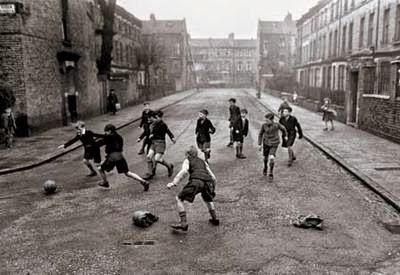We Used to Have a Toy
We used to have a toy; it was the most amusing toy in the world. We didn’t invent it ourselves, but we played with it better than its inventors did. We accepted some words of its original language: “ful” (“foul”), “corner”, “orsai” (“offside”), but we filled it right away with our own words: “sombrero” (to flick the ball over one’s head), “rabona” (to hit ball by crossing one foot behind the other), “pared” (wall pass).

We started playing on the sidewalk, in the backyards, in winter and in summer. Until one day, some among us — the ones who played better — left their jobs and devoted themselves to it completely. And how well they played!
The beauty of their movements was so great that many of us stopped playing and took to watching them. We established social clubs, we built stands of wood and concrete, just to see the best from each neighborhood from up close. Next, we organized weekly tournaments, discussed the rules and picked the colors for the jerseys. We were men, but we behaved like boys would on the morning of January 6th.
So, of course, those of us who were born in a certain neighborhood wanted our people to win on Sunday, and for our neighbors to lose. Thus, we incorporated a new element into the game: while the match lasted, those of us who were watching had to sing as a choir and very loudly. And so we did.
We were so good at singing! We soon found out that we were not only good at playing with the toy, but also at watching the game. We didn’t turn out to be apathetic spectators like on other continents. We got involved, we would throw kilos of shredded paper to welcome our men and we would compose chants. «Yes, yes gentlemen / I am a Racing supporter. / Yes, yes gentlemen / from the bottom of my heart». We had fun during the week inventing new verses, and we even began to compose other ones, more picaresque, in order to bother our neighbors. «River had a cart / Boca took it away / River came away crying / Boca came away with the championship». Bothering the neighbors made us laugh.
Imagine. If the toy was already amusing in silence, then with the addition of the stands, the hobby became an amazing spectacle. So much so, that people from all over the world came to our country to experience our popular festivity filled with shredded paper and little chants. We started to call the action of bothering the rival with witty songs «hinchar» (“inflate”). We baptized ourselves as «hinchas» (“supporters”) and to the frenzied group in the stands we gave the name of «hinchada» (“group of supporters”). At that point, we had learned to dress the toy with accessories.
One day the groups of supporters became so numerous, and so effusive, that we needed to put steel bars in the stands, waist-high, so that we wouldn’t fall like an avalanche due to the excitement. Later on, that steel bar started being used by the most full-throated supporter, who would direct the improvised choir by standing on top of it. We baptized that supporter with the name of «barrabrava» (“fierce bar”) because his juggles were vertiginous.
Our best players, who were already starting to play in other countries, felt a sort of emptiness when they made their debuts abroad: the excitement from the stands wasn’t the same. Everybody sitting, nobody singing. Many chose to go back to their clubs of origin — even if it meant losing a fortune — so that they could hear again the low roar of the supporters directed by their leaders. It was then that we began to be more interested in the accessory than in the toy itself.
Around that time, we started to exaggerate the excitement that we were feeling. We, the supporters, who until then had been caricaturing small fictional wars, forgot that we were performing. We started calling our affinity for a club «passion».

And the chants turned literal. «They ran toward here / They ran toward there / We are going to kill all those faggots». Many companies found this highly profitable, and they reaffirmed the idea of «passion». The passion of the gathering. All united by one passion. The toy became as important as life itself. It was, even, a summation of life.
So, one afternoon, we stopped cheering for the players and we began to be supporters of our own passion. «Years go by / players come and go / the supporters always here / never cease to cheer».
While the game was occurring on the field, the stands were busy congratulating themselves. And we thought it was sensible to found newspapers, radio stations and TV channels that would inform about the game 24 hours a day, although the game was on only once a week. It didn’t seem excessive to us, because from Tuesday to Saturday we wanted to know about the supporters, the leaders and the passion.
Newspapers gave as much importance, on the front cover, to a conflict between supporters as to the war in the Middle East. And the leaders of the groups started to have names and last names in the press. Pictures were being taken of them, people would talk about them in gatherings. The greater their savagery, the bigger their fame and the headline.
The commentators of the game, who at the beginning would only say the names of the players on the radio, also began to simulate an exaggerated excitement in their commentary. During the games, they would scream the goals on the microphone for fifty seconds, as if possessed, as if there wasn’t anything more important in the whole universe, and then they would ask for peace in the stands.
No one knows exactly when it all went to shit. No one remembers when the first of ours was killed, nor at whose hands. No one knows how some became the owners of the toy. But one day the stands turned into battlefields. And the press wouldn’t speak of the deaths of human beings but the deaths of «supporters of» in order to feed the passion.
The players who triumphed abroad didn’t long to come back anymore, and the owners of the toy filled their pockets without improving its workings. Today, when we go to see ours, there are no “sombreros”, nor “rabonas”, nor “paredes” anymore. The grass is long and neglected. And they installed a plastic tube so that the players can enter the field without being killed.
We used to have a toy. It was the most amusing toy in the world. We still don’t know if it was an accident, but we broke the toy into a thousand pieces. We fucked it up.
And the saddest part is that we don’t know how to play anything else.
Original text by Hernan Casciari